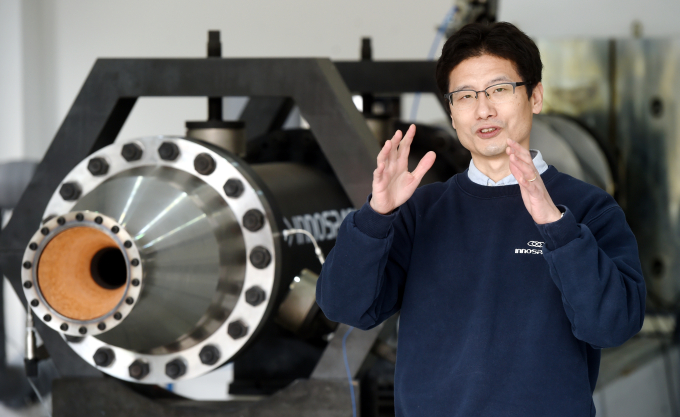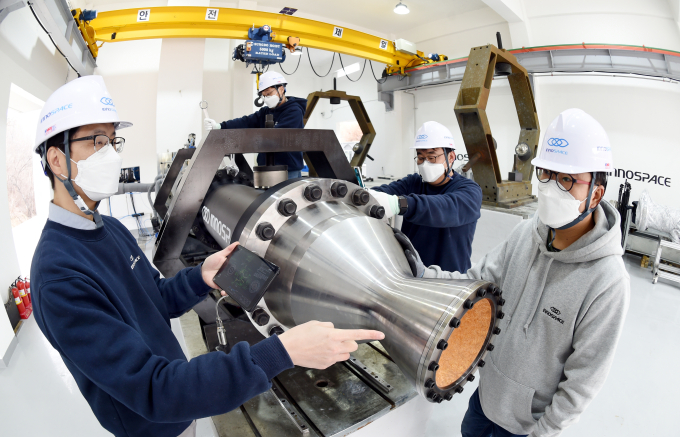Startups
Satellite launcher startup raises over $7 mn in Series A funding
By Jan 11, 2021 (Gmt+09:00)
3
Min read
Most Read
S.Korea's LS Materials set to boost earnings ahead of IPO process


CarlyleŌĆÖs Rubenstein sees commercial real estate undervalued


Samsung Electronics' key M&A man returns; big deals in the offing


Money pours in for technology to reshape Korean restaurants


CJ CheilJedang to sell feed, livestock unit for $1.4 bn



The fundraising comes after it received pre-series A funding for an unidentified amount in 2019, reflecting the rapid growth in the small satellite market for commercial and scientific use.┬Ā
┬Ā
VC firms participating in the latest financing package include Company K Partners Ltd., Intervest Co., Kolon Investment Inc., Hana Ventures Inc., Albatross Investment and JX Partners.
Other investors are FuturePlay, D.Camp and MiraKle Lab as startup accelerators, which provide advice and resources to venture firms, as well as unidentified strategic investors. ┬Ā
Both Kolon Investment and FuturePlay also took part in the pre-Series A funding round in 2019, which brought in DSC InvestmentŌĆÖs startup accelerator Schmidt. ┬Ā
Founded in 2017, Innospace develops launch vehicles for satellites weighing up to 600 kg. Its founder and CEO Kim Soojong is a rocket propulsion systems expert with a doctorate in aerospace and mechanical engineering from Korea Aerospace University.
Previously, he developed guided weapons at Hanwha Corp. as a senior research engineer after working as a postdoctoral research fellow at Israel Institute of Technology, or Technion.
Investors focused on its technology and the market growth of small satellites, which have been driving space industry growth.
InnospaceŌĆÖs core technology lies in its hybrid rocket motors composed of solid fuel and liquid oxidizers. In comparison, conventional rocket fuels are either solid or liquid. Solid fuel-powered engines are stable in terms of technology and are cost-efficient, but their propellant rocket engines are hard to control when it comes to the thrust level. On the other hand, liquid-only fuels are expensive.┬Ā
The hybrid engines developed by Innospace upgrade the insufficient thrust of conventional hybrid engines, while securing both high stability and price efficiency.

Additionally, the Korean startup has developed small research rockets and is supplying them to defense service companies and government agencies in the country.
It is now concentrating on developing rocket engines for nanosatellites weighing up to 50 kg to place them into low-Earth orbit at an altitude of at least 500 km. If Innospace succeeds in its test launch to take place in Brazil later this year, the venture firm will then make its foray into 150kg microsatellites and 500kg minisatellites.
The small satellite market has been rapidly growing with demand for broadband, TV and Earth observation services, attracting large amounts of venture capital investments globally.┬Ā
Launches of small satellites, weighing up to 600 kg, topped 1,000 last year, compared to 1,700 made over the previous seven years between 2012 and 2019, according to Bryce Space and Technology, a US space technology research firm. The global small satellite launch market is projected to report over a tenfold increase to 37 trillion won by 2027 from 3 trillion won last year.
ŌĆ£The small satellite launch market is in a supply and demand imbalance, with an average wait time of one year,ŌĆØ one of the Innospace investors told Market Insight, the capital news outlet of The Korea Economic Daily. ŌĆ£Globally, only 10 companies have been successful in commercializing small satellite launchers. Innospace has high growth potential.ŌĆØ
Write to Jung-hwan Hwang at jung@hankyung.com
Yeonhee Kim edited this article.
More to Read
Comment 0
LOG IN



